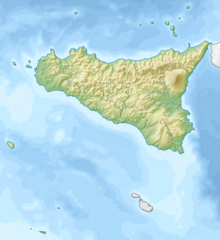
Back Batalla de Panorm Catalan Schlacht von Panormus German Batalla de Palermo Spanish نبرد پانورموس Persian Bataille de Panormus (251 av. J.-C.) French Pertempuran Panormus ID Battaglia di Palermo (251 a.C.) Italian パノルムスの戦い Japanese პანორმუსის ბრძოლა Georgian Slag bij Panormus Dutch
| Battle of Panormus | |||||||
|---|---|---|---|---|---|---|---|
| Part of the First Punic War | |||||||
| |||||||
| Belligerents | |||||||
| Rome | Carthage | ||||||
| Commanders and leaders | |||||||
| Lucius Caecilius Metellus | Hasdrubal | ||||||
| Strength | |||||||
| 2 legions and 2 Alae (16,000–20,000 men) |
| ||||||
| Casualties and losses | |||||||
| Unknown, but light |
| ||||||
Location of Panormus, on the north coast of Sicily | |||||||
The Battle of Panormus was fought in Sicily in 250 BC during the First Punic War between a Roman army led by Lucius Caecilius Metellus and a Carthaginian force led by Hasdrubal, son of Hanno. The Roman force of two Roman and two allied legions defending the city of Panormus defeated the much larger Carthaginian army of 30,000 men and between 60 and 142 war elephants.
The war had commenced in 264 BC with Carthage in control of much of Sicily, where most of the fighting took place. In 256–255 BC the Romans attempted to strike at the city of Carthage in North Africa, but suffered a heavy defeat by a Carthaginian army strong in cavalry and elephants. When the focus of the war returned to Sicily, the Romans captured the large and important city of Panormus in 254 BC. Thereafter they avoided battle for fear of the war elephants which the Carthaginians had shipped to Sicily. In late summer 250 BC Hasdrubal led out his army to devastate the crops of the cities of Rome's allies. The Romans withdrew to Panormus and Hasdrubal pressed on to the city walls.
Once he arrived in Panormus, Metellus turned to fight, countering the elephants with a hail of javelins from earthworks dug near the walls. Under this missile fire the elephants panicked and fled through the Carthaginian infantry. The Roman heavy infantry then charged the Carthaginian left flank, which broke, along with the rest of the Carthaginians. The elephants were captured and later slaughtered in the Circus Maximus. This was the last significant land battle of the war, which ended nine years later in a Roman victory.
